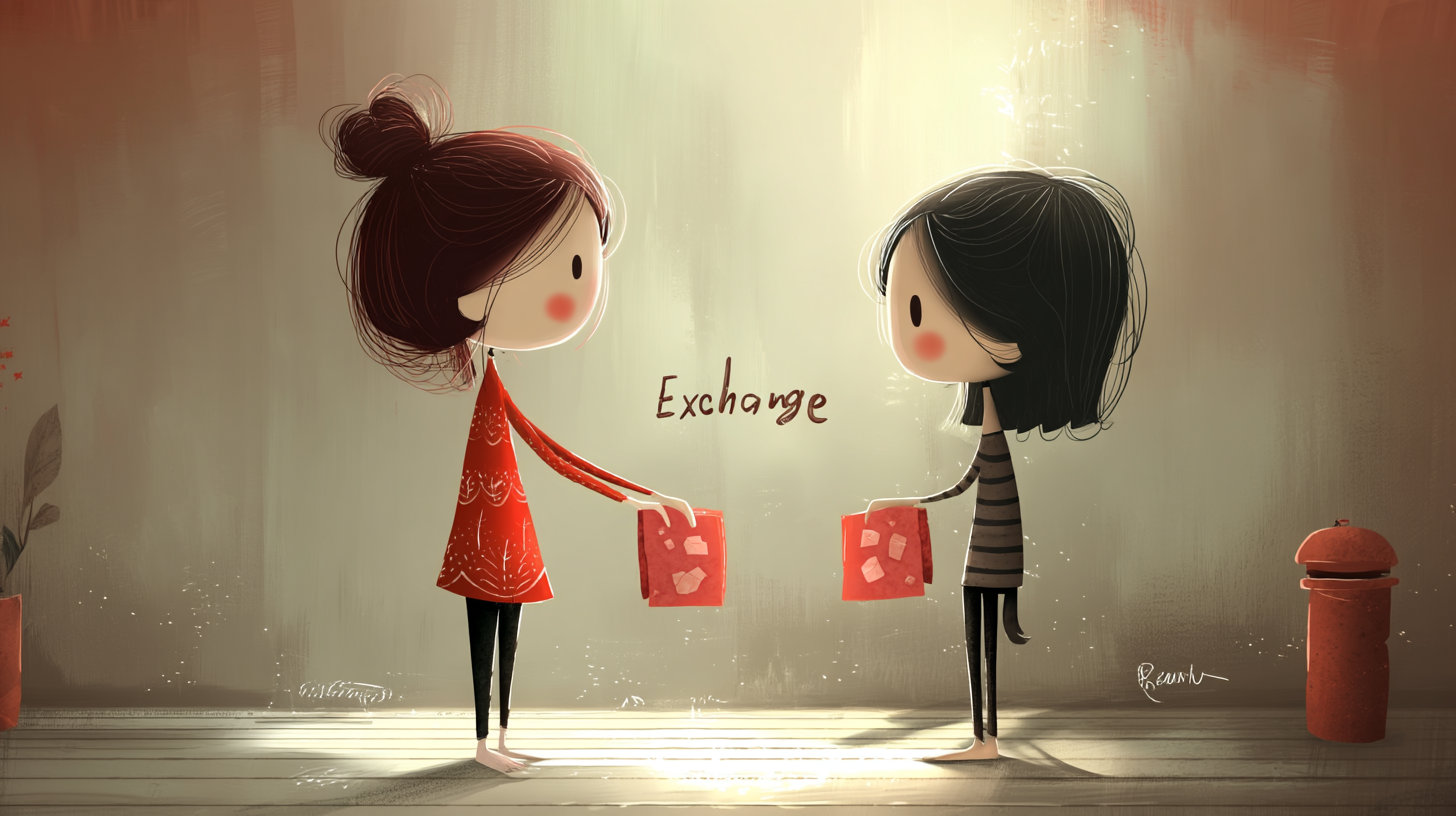“Exchange” means giving something and getting something back from someone.
「exchange」は、物や情報を人とやりとりすることを意味します。
以下は英単語 “exchange” に関するストーリー型学習コンテンツです。まずは大枠の意味を理解して最後の文章で確認しましょう。
主な意味(main meaning)
| 品詞 | 意味(簡潔な定義) | 発音記号(IPA) | 英語例文 |
|---|---|---|---|
| 名詞 | 物や情報を交換すること | /ɪksˈtʃeɪndʒ/ | We had an exchange of ideas during the meeting. |
| 動詞 | 何かを他のものと取り替えること | /ɪksˈtʃeɪndʒ/ | She exchanged her old phone for a new one. |
語源(etymology)
「exchange」はラテン語の ex-(外に)と cambiare(変える)から来ており、「外に向かって変える」→「交換する」というイメージです。
類義語(synonyms)
| 類義語 | 英語例文 |
|---|---|
| trade | They traded baseball cards after school. |
| swap | I swapped my sandwich for his chocolate bar. |
| replace | He replaced his broken shoes with a new pair. |
| barter | In the past, people bartered goods instead of using money. |
| switch | Let’s switch seats so you can see better. |
反義語(antonyms)
| 反義語 | 英語例文 |
|---|---|
| keep | I decided to keep the book instead of exchanging it. |
| hoard | He hoarded all the information and didn’t share it with anyone. |
コロケーション(collocations)
| コロケーション | 英語例文 |
|---|---|
| exchange ideas | They exchanged ideas about the new project. |
| exchange gifts | We exchange gifts during the holiday season. |
| exchange money | You can exchange money at the airport. |
| cultural exchange | She took part in a cultural exchange program in Japan. |
| foreign exchange | He studies foreign exchange rates every day. |
2項表現(binomials)
| 2項表現 | 英語例文 |
|---|---|
| give and take | A good friendship needs give and take. |
| back and forth | They talked back and forth about the plan. |
英語ストーリー(english story)
Title: The Exchange Program
Mika was excited. She was joining a cultural exchange program with a school in Australia. It was her first time going abroad, and she wanted to exchange ideas and learn about different customs. Before she left, her teacher said, “This is not just about traveling. It’s a chance for give and take. You’ll learn and teach at the same time.”
When Mika arrived, her host family welcomed her warmly. They exchanged gifts, and Mika gave them a small handmade fan from Japan. During school, she took part in a discussion about school life in Japan. The students were surprised and curious, so they traded many questions and answers.
One day, Mika wanted to buy a souvenir. She went to a small shop and tried to exchange money, but the shop didn’t accept yen. She had to find a place that offered foreign exchange services. After that, she learned to always keep some local currency.
Throughout her stay, Mika noticed many differences. But instead of feeling shocked, she enjoyed the back and forth of sharing and learning. When it was time to return, her host sister gave her a bracelet and said, “Let’s stay friends forever.”
Mika smiled. She realized that even though people live in different places, they can connect through simple acts of exchange.
和訳
タイトル:交換プログラム
ミカはワクワクしていました。彼女はオーストラリアの学校との文化交流(cultural exchange)プログラムに参加するのです。初めての海外で、彼女はアイデアの交換(exchange ideas)やさまざまな習慣を学びたいと思っていました。出発前、先生はこう言いました。「これはただの旅行じゃありません。ギブ・アンド・テイク(give and take)の機会です。学び、そして教える時間ですよ。」
ミカが到着すると、ホストファミリーは温かく迎えてくれました。お互いにプレゼントを交換(exchanged gifts)し、ミカは日本の手作り扇子を渡しました。学校では、日本の学校生活について話すディスカッションに参加しました。生徒たちは驚いたり興味を持ったりして、多くの質問と答えをやりとり(traded)しました。
ある日、ミカはお土産を買いたくて小さなお店に行きました。お金を両替(exchange money)しようとしましたが、そのお店では円を受け付けていませんでした。そこで、外貨両替(foreign exchange)のサービスがある場所を探さなければなりませんでした。その経験から、地元のお金を少し持っておくことの大切さを学びました。
滞在中、ミカは多くの違いに気づきました。でも、驚くよりも、学び合いのやりとり(back and forth)を楽しむことができました。帰るとき、ホストの妹がブレスレットをくれて言いました。「ずっと友達でいようね。」
ミカは微笑みました。違う場所に住んでいても、交換(exchange)というシンプルな行動を通して人とつながれるのだと気づいたのです。
Q&A
Q: 「exchange」と「trade」はどう違いますか?
A: 「exchange」は物だけでなく、情報・感情・意見など、広い意味での「やりとり」に使われます。一方「trade」は、主に物品やサービスの「売買・取引」というビジネス的な意味合いが強いです。
Q: 「exchange」と「swap」はどう違いますか?
A: 「swap」は日常的でカジュアルな交換に使われ、たとえば「お菓子を取り替える」「席を替わる」といった軽い交換にぴったりです。「exchange」はよりフォーマルで、物だけでなく情報や意見にも使えます。
Q: 「exchange」と「replace」の違いは何ですか?
A: 「replace」は「古いものを新しいものに取りかえる」という意味で、交換の相手が人ではなく、自分の中で置き換えるイメージです。「exchange」は、他の人と何かをやりとりする場合に使います。
Q: 「exchange」と「barter」の違いは何ですか?
A: 「barter」はお金を使わずに物々交換することを意味します。古代の取引や、現代でも特定のコミュニティで使われます。「exchange」はお金の有無に関係なく、幅広く交換全般に使われます。
Q: 「exchange」と「switch」の違いは?
A: 「switch」は「位置・役割・順番などを入れ替える」という意味で、例えば「スイッチを切り替える」「座席を交代する」などに使います。「exchange」はもっと広く、感情や言葉などの交換にも使えます。
Q: 「exchange ideas」と「share ideas」は同じですか?
A: 似ていますが、「exchange ideas」はお互いにアイデアをやりとりする意味で、双方向のやりとりが強調されます。「share ideas」は自分のアイデアを他人に伝える、という一方向のニュアンスも含まれます。
Q: 「exchange gifts」と「give gifts」はどう違いますか?
A: 「give gifts」は一方的にプレゼントをあげる場合にも使えますが、「exchange gifts」はお互いにプレゼントを交換する、という双方向の行為を指します。
Q: 「exchange money」と「pay money」は何が違いますか?
A: 「exchange money」は通貨を別の通貨に両替することを意味します。「pay money」は代金を支払うことを意味し、目的が異なります。



コメント